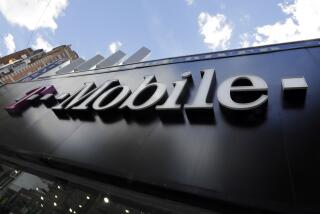PacBell Hearings Expected to Focus on Caller ID Sales
- Share via
As regulatory hearings begin today into complaints that Pacific Bell’s marketing programs are unlawful, testimony is likely to revolve around the company’s all-out push for sales of caller ID.
This add-on service--which requires special equipment to display the name and phone number on incoming calls--has long been the focus of heated debate in privacy-conscious California. PacBell’s aggressive marketing of the feature is at the heart of several county investigations, in addition to the state inquiry.
Employees and consumer groups, set to testify during the hearings at the California Public Utilities Commission, say PacBell’s focus on caller ID has resulted in customers being signed up for a service or equipment they didn’t want or request.
In addition, employee accounts and internal sales documents obtained by The Times show that the company has launched a campaign designed to steer customers away from a free protection feature that allows callers to automatically shield their identity and number from caller ID subscribers. This service, known as complete blocking, can undermine sales of caller ID.
Officials at PacBell, the state’s largest phone company, deny any wrongdoing.
“We’re absolutely committed to ethical selling and honest communication with our customers,” said John Britton, a PacBell spokesman. If PacBell customers are being misled, he said, “it’s going to cease--whether it’s internal or external--because people have the right to accurate information.”
In response to the growing complaints, PacBell on Wednesday canceled a contract with St. Louis-based Business Response Inc., a telemarketing firm that PacBell says provided incorrect information on blocking options.
Beginning today, PacBell will call any customers who changed their blocking status as a result of the BRI campaign to make sure they have the feature they want, Britton said.
Nationwide, caller ID is second only to call waiting in popularity. But California was among the last states to introduce the service. It has been highly lucrative in other states for San Antonio, Texas-based SBC Communications, PacBell’s parent company. But PacBell’s service, which costs $6.50 a month, was approved on the condition that the company also offer strong privacy-protection features.
Consumer groups, citing the constitutional right to privacy and California’s unusually high rate of unlisted phone numbers, successfully argued for an elaborate, $32-million educational campaign on caller ID.
In the end, more than 60% of PacBell customers chose to automatically shield themselves from caller ID machines. And a year after the start of caller ID sales in 1996, fewer than 2% of PacBell residential customers had signed up.
Sources close to the company say the low caller-ID sales numbers were galling to SBC. The firm, known in the industry as “the king of caller ID,” has sold caller ID to more than half its customers in its five-state service area.
Under SBC, PacBell has spent unprecedented amounts of money--the company won’t provide exact figures--promoting caller ID through advertising, direct mail and telemarketing.
In addition, company officials acknowledge that they are working hard to convince customers that they don’t need complete blocking.
Instead, employees say, PacBell instructs them to push a feature called “selective blocking,” which transmits a customer’s name and number on every call unless the customer chooses to shield that information. To do so, the caller presses *67 (1167 on a rotary phone) before dialing.
When a caller ID customer receives a call from a blocked number, a special screen displays “anonymous” or “private.” Some customers also subscribe to “anonymous call rejection,” which cuts off blocked callers before the phone rings.
Customers with complete blocking can unblock their number on individual calls by using the code *82 (1182 on rotary phones) before dialing.
Customers who don’t specify a choice get selective blocking automatically.
Under state rules, both blocking options must remain free of charge. In addition, PacBell and other local phone companies are required to provide complete and unbiased information to customers about their blocking options, state regulators say.
However, service representatives are set to testify that they are told to encourage customers who have complete blocking to switch to selective blocking. According to documents obtained by The Times, PacBell provides scripts that begin: “While I was reviewing your account, I noticed something that concerns me. Are you aware that you have complete blocking on your telephone number?”
Employees are given “unblocking” quotas that qualify them for prizes and bonuses based on the number of complete blocking features they remove.
One promotion offered a caller ID device for $9.95 to customers who chose selective blocking, and the same box for $19.95 to customers with complete blocking.
If state regulators find PacBell’s actions unlawful, the PUC can impose fines and award compensation to customers. In addition, it could halt PacBell’s caller ID promotions or impose new limits. State prosecutors, who are reviewing allegations of fraud by PacBell, could take separate action.
More to Read
Inside the business of entertainment
The Wide Shot brings you news, analysis and insights on everything from streaming wars to production — and what it all means for the future.
You may occasionally receive promotional content from the Los Angeles Times.










